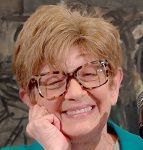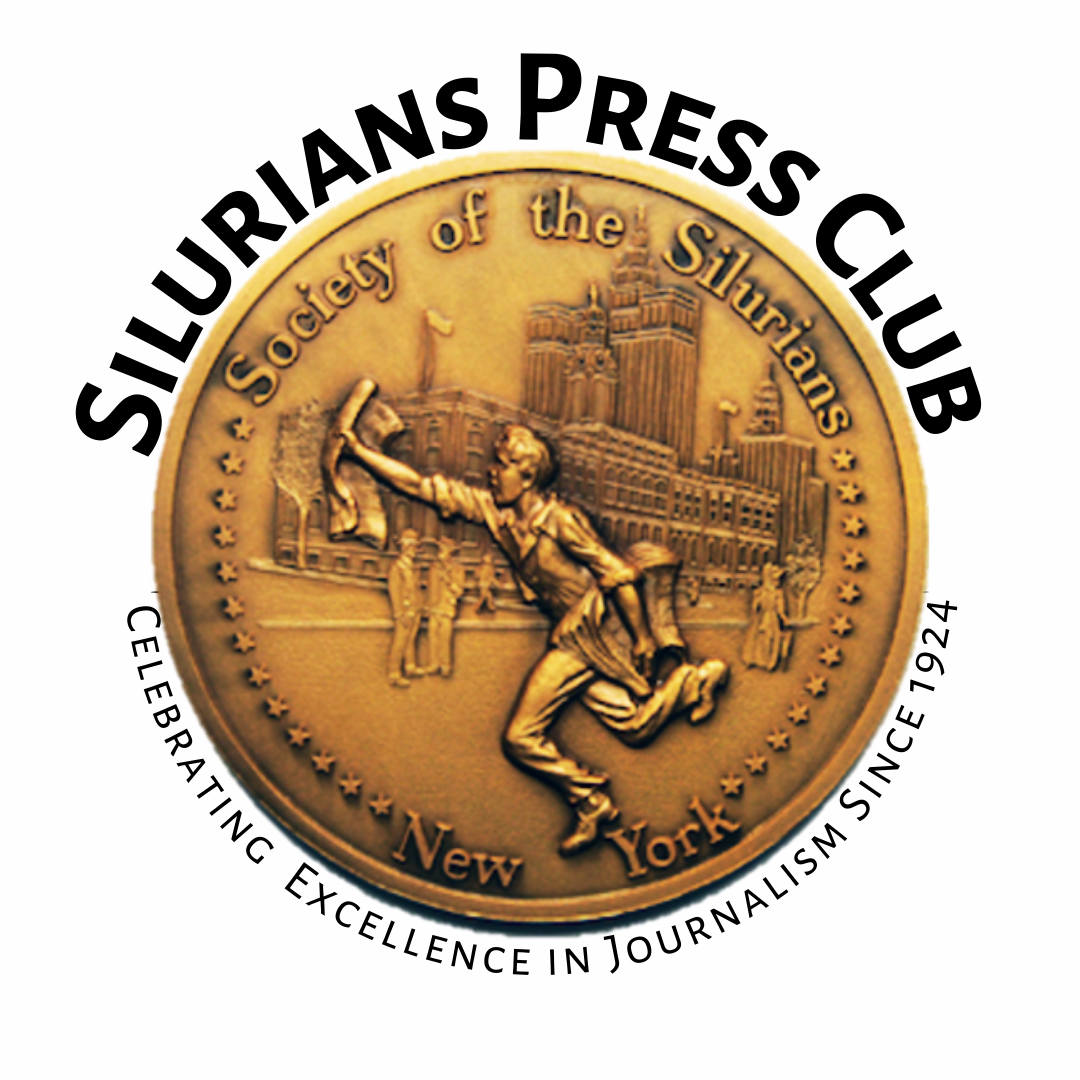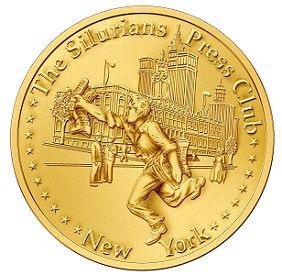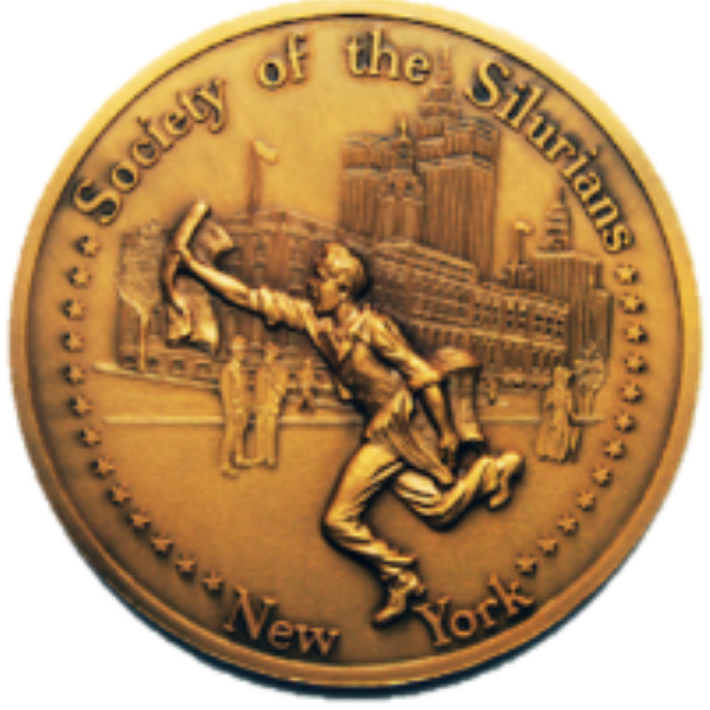
Joyce Purnick
Joyce Purnick-2023 Lifetime of Achievement Award
By David A. Andelman
When it comes to Joyce Purnick, there are a multitude of firsts. As Silurians president Joe Berger pointed out, she was the first female City Hall bureau chief for The New York Times, the first female Metro editor of The Times, and in March, the last half of the first husband-wife team to win the Lifetime Achievement Award of the Silurians Press Club—bestowed at a luncheon ceremony at the National Arts Club.
But as anyone who has ever known Joyce Purnick, ever worked with her, certainly admired her, there is ever so much more to her than any litany of firsts. And Berger pointed all of this out in his introduction before presenting her with an honor that has also been bestowed, among others, on Walter Cronkite, Gay Talese, Pete Hamill, Murray Kempton, and husband, Max Frankel before her.
As for Purnick, “fearlessly honest,” “tough, shrewd, and knowledgeable,” were the adjectives that leaped first to Berger’s lips, leading to his conclusion that in her wake she’s left “a trail of shattered glass given all the ceilings she has broken.“ It was a theme that resonated through the lavish encomiums lathered on her by one of her biggest admirers and oldest friends, another former Times City Hall bureau chief and columnist, Clyde Haberman.
Haberman described her in even more vivid terms. “She frankly had the best bullshit detector ever known in journalism,” he began. “And then there is her recipe for lemon meringue pie.” But he was particularly taken with a story from her youth, growing up in Queens where “there was this teenage kid about her same age who was completely reckless in how he drove through the neighborhood just terrorizing everybody, hot-rodding through in his sports car, heedless at everybody in his way. Joyce’s mother Charlotte, who sadly I never had a chance to meet, said to Joyce, ‘stay away from that snot-nosed kid.’ It’;s as good a warning as you’re ever going to hear about Donald Trump. And we’;re all still trying to stay away from that snot-nosed kid.”
Before turning the podium over to Joyce, Clyde thanked her “on behalf of all the city hall reporters who are in this room. I think every one of us learned basically almost everything we know from you personally. You showed us how to understand the city, how to understand power in this town in a way that most of us only understood a fraction of. She had no patience for shortcuts. When you look up synonyms in the thesaurus for integrity, the first option reads Joyce Purnik.”
And with that, Joyce took the podium in her own defense, or at least elaboration. She began, of course, with journalism. “The arc of my career reflects profound changes in our profession, not all of them for the good. Some, but not all, newspapers have changed, local coverage has changed. The definition of truth has changed in some quarters and journalists’ careers have changed. I have little doubt that if I came along today, I would be working in another profession. Unfortunately, journalism wouldn’t have me and maybe hard as this is for me to believe, I wouldn’t have journalism.” Yet back in high school, all she ever really wanted to be was a reporter.
“I was bad at math,” she smiled. “I was truly innumerate and allergic to science. So my wise mother, worried about my future, encouraged me to study music and art and to write. Writing stuck, and journalism was the right fit.” Watching President Kennedy’s televised news conferences, “I saw a few women sprinkled in among the men reporters, and I was hooked. That was it.”
At the Post, it was Dorothy Schiff who gave her a first break. “I typed up a week’s worth of TV listings. I wrote squibs about sitcoms and about old movies, not poetry, but it kept things interesting. I worked into the early morning hours in the composing room with printers, many of them who could not hear, and they labored over hot type. I learned to read upside down and backwards. I helped fashion writer Eugenia Shepherd select the photos that accompanied her stories.”
She got her first byline less than two years later. “I was a full-fledged reporter.” She paused reflectively. “Women at the Post were not limited to the ‘women’s pages,’ as they used to be called. We covered everything and that included my abiding interest in local government and politics. Writing about my city and state was what I had long wanted to do.” And she did that, at least until Rupert Murdoch arrived, buying the Post in 1976.
“One very sad thing that has not changed over the decades is Murdoch. He pursued profits and power—never truth or justice. I stayed a year hoping against hope he would not be as bad as his reputation suggested it would be. He turned the Post into the equivalent of a publicity sheet for Ed Koch. To preserve my reputation, I quit and joined the unemployed. I had been at the Post eight years.”
But it happened to be a fortuitous moment for Joyce, and a transformative one for the newspaper industry. At The Times, a number of women journos had just filed a class action sex discrimination suit and won—the paper settling with them. One of the deals was “to hire some women fast, and since covering New York was a fundamental priority of The Times in those days, I was qualified. I was hired one year almost to the day after the lawsuit was settled,” Joyce recalled.
Ed Koch was mayor. “Covering Koch was a kick because as those of you who also covered him will well remember, he was great copy. He could not stop making news. Front-page bylines, news analyses, week-in-review pieces. They never stopped, because he never did.” Coverage of Koch quickly morphed into bureau chief at City Hall, then a column, and then there was Max.
“I found the love of my life at The Times,” she smiled and looked over at him. “As most of you know, Max Frankel was a widower and the executive editor of The Times. I did not work directly for Max, but he was the top guy in the news department, and I was a member of the news staff. We knew. I knew. Our relationship was bound to be complicated, but we were willing to pursue it.”
Finally, Joyce turned to journalism today, what’s right and what’s not. “A lot that’s going on today is far from positive,” she began. “I will not dwell on it, but I wouldn’t feel right speaking to a room full of journalists without at least touching on the problems—the disappearance of local newspapers throughout the country and the cheapening and politicization of many of those that still exist. We all know that newspapers have always been political. But as I see it, the divisions today, the peddling of distortions and outright lies, thank you Rupert, is just plain ugly and destructive.”
What she would especially like to see is more coverage of Mayor Eric Adams. “As a reader, I don’t think I’ve read enough about Adams. I don’t know why that is. I don’t know why the coverage of him is episodic, but I think there’s a lot more to know about him. And for some reason, we don’t know a lot about Adams, about the way he lives his life, about what he believes. The Times and other papers have shown the conflicts of interest quite well. But I'd like to know more about the man and his values and his history.”
But Joyce did have at least one positive message and a hope for the future of the career she has so wholeheartedly embraced. “The profession still attracts promising young talent,” she concluded. “I read and see and watch them and hear them every day. There are not enough of them in enough places, but I’m counting on them to turn things around someday. Happily, I lived through the Golden Age.”


